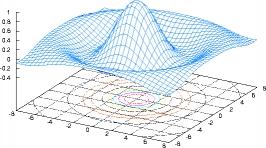
GNU Octave is a high-level language, primarily intended for numerical computations. It provides a convenient command line interface for solving linear and nonlinear problems numerically, and for performing other numerical experiments using a language that is mostly compatible with Matlab. It may also be used as a batch-oriented language.
Many, but not all, Matlab .m scripts will run in Octave. MEX files (to call custom C or Fortran routines directly from Matlab) can be executed in Octave with some limitations.
Octave runs are typically slower than the equivalent Matlab run. However, Octave is not license-limited, so many more simultaneous runs are possible than with Matlab. Thus, on the Biowulf cluster Octave is most useful for projects which can be split into large numbers of independent simultaneous runs.
| OSMesa library: | Offscreen rendering with OpenGL will be disabled. |
| Qscintilla library: | Built-in GUI editor is disabled. |
Allocate an interactive session and run the program.
Sample session (user input in bold):
[user@biowulf]$ sinteractive salloc.exe: Pending job allocation 46116226 salloc.exe: job 46116226 queued and waiting for resources salloc.exe: job 46116226 has been allocated resources salloc.exe: Granted job allocation 46116226 salloc.exe: Waiting for resource configuration salloc.exe: Nodes cn3144 are ready for job [user@cn3144 ~]$ module load octave [+] Loading gnuplot 5.2.2 ... [+] Loading HDF5 1.10.1 [+] Loading LAPACK/3.8.0 3.8.0-gcc4.8.5 libraries... [+] Loading FFTW 3.3.7 , compiled with gcc4.8.5 and openmpi2.1.2 ... [+] Loading ImageMagick 7.0.7 on cn4242 [+] Loading gl2ps 1.4.0 ... [+] Loading Octave 4.4.0 ... [user@cn3144 ~]$ octave --gui
Allocate an interactive session and run the program.
Sample session (user input in bold):
[user@biowulf]$ sinteractive salloc.exe: Pending job allocation 46116226 salloc.exe: job 46116226 queued and waiting for resources salloc.exe: job 46116226 has been allocated resources salloc.exe: Granted job allocation 46116226 salloc.exe: Waiting for resource configuration salloc.exe: Nodes cn3144 are ready for job [user@cn3144 ~]$ module load octave [+] Loading gnuplot 5.2.2 ... [+] Loading HDF5 1.10.1 [+] Loading LAPACK/3.8.0 3.8.0-gcc4.8.5 libraries... [+] Loading FFTW 3.3.7 , compiled with gcc4.8.5 and openmpi2.1.2 ... [+] Loading ImageMagick 7.0.7 on cn4242 [+] Loading gl2ps 1.4.0 ... [+] Loading Octave 4.4.0 ... [user@cn3144 ~]$ octave-cli warning: function ./test.m shadows a core library function GNU Octave, version 4.0.2 Copyright (C) 2016 John W. Eaton and others. This is free software; see the source code for copying conditions. There is ABSOLUTELY NO WARRANTY; not even for MERCHANTABILITY or FITNESS FOR A PARTICULAR PURPOSE. For details, type 'warranty'. Octave was configured for "x86_64-unknown-linux-gnu". Additional information about Octave is available at http://www.octave.org. Please contribute if you find this software useful. For more information, visit http://www.octave.org/get-involved.html Read http://www.octave.org/bugs.html to learn how to submit bug reports. For information about changes from previous versions, type 'news'. octave:1>a=1+1 a = 2 octave:2> sin(a) ans = -0.27942 octave:3> a=5*pi x = 15.708 octave:4> sin(a) ans = 6.1230e-16 octave:6> quit [user@cn3144 ~]$ exit salloc.exe: Relinquishing job allocation 46116226 [user@biowulf ~]$
!/bin/env octave -qf
if( nargin != 1 )
printf( "Usage: %s <integer>\n", program_name );
return;
endif
len = str2num( argv(){1} );
printf( "Working with array size %6d\n", len );
clear a;
tic();
for i=1:len
a(i) = i;
endfor
time1 = toc();
a = [1];
tic();
for i=2:len
a = [a i];
endfor
time2 = toc();
printf( "The time taken for method 1 was %.4f seconds\n", time1 );
printf( "The time taken for method 2 was %.4f seconds\n", time2 );
Submit this job using the Slurm sbatch command.
-------- file array.bat---------------------- #!/bin/bash module load octave/4.0.2 cd /data/user/mydir ./array.oct 10000 ---------------------------------------------
sbatch [--mem=#g] array.bat
Create a swarmfile (e.g. octave.swarm). For example:
array.oct 1000 > array.out.1000 array.oct 2000 > array.out.2000 array.oct 3000 > array.out.3000 [...]
Submit this job using the swarm command.
swarm -f octave.swarm [-g #] [-t #] --module octavewhere
| -g # | Number of Gigabytes of memory required for each process (1 line in the swarm command file) |
| -t # | Number of threads/CPUs required for each process (1 line in the swarm command file). |
| --module octave | Loads the octave module for each subjob in the swarm |
If you have a particular package from the Octave-Forge project that you need installed, let us know. To see the centrally installed packages, use pkg list e.g.
octave:3> pkg list
Package Name | Version | Installation directory
--------------+---------+-----------------------
control | 2.8.2 | /usr/local/apps/octave/4.0.2/share/octave/packages/control-2.8.2
image | 2.0.0 | /usr/local/apps/octave/4.0.2/share/octave/packages/image-2.0.0
signal | 1.3.2 | /usr/local/apps/octave/4.0.2/share/octave/packages/signal-1.3.2
You can also install your
own Octave tool-boxes in your home directory with pkg install. You will need to set the TMPDIR variable first. e.g.
cn1234% export TMPDIR=/lscratch/$USER
cn1234% octave
octave:1> pkg install -forge fpl
For information about changes from previous versions of the fpl package, run 'news fpl'.
octave:2> pkg list
Package Name | Version | Installation directory
--------------+---------+-----------------------
control | 2.8.2 | /usr/local/apps/octave/4.0.2/share/octave/packages/control-2.8.2
fpl | 1.3.5 | /home/teacher/octave/fpl-1.3.5
image | 2.0.0 | /usr/local/apps/octave/4.0.2/share/octave/packages/image-2.0.0
signal | 1.3.2 | /usr/local/apps/octave/4.0.2/share/octave/packages/signal-1.3.2